Are you ready to stop dieting, obsessing over food and change the way you think about food?
Intuitive Eating was one of the first concepts I came across on my journey towards making peace with food. But I felt so terrified to let go of the food rules I followed. It wasn’t until years later I was finally able to truly dive into the process and enjoy the benefits of food freedom.
Intuitive Eating is a revolutionary approach to health and wellness that can help you break free from diet culture. It can also empower you to make positive changes in your relationship with food. And all that without any restrictive diets or calorie counting.
In this article, I’m sharing the 10 Intuitive Eating Principles and the Intuitive Eating Hunger Scale. I will also share how to start applying Intuitive Eating. And when it’s better to consider working with an Intuitive Eating Coach or a Nutritional Therapist.
Before You Get Started with the Principles of Intuitive Eating
Before trying out intuitive eating, truly ask yourself a few questions:
Is my diet balanced? Do the signs of hunger come on gradually, or do I experience being ‘hangry’ most days? Do I feel satisfied after a meal or do I crave more? Do I need to finish every single meal with a sweet? Is my energy balanced through the day or do I have dips in energy levels?
Your answers will help you determine if you need to look into nutritional balance and make sure you do so first.
The out-of-balance body will not send accurate signals and may sabotage all your great efforts towards intuitive eating. This may leave you disheartened and unsure of what to do next.
Create physical balance first, which is the essential step in learning intuitive eating. Because you cannot fully listen to your gut and your body if your gut and body completely is out of balance.
Not really not sure where to start and whether you are balanced physically? Consider working with an eating disorder coach. Even better if they are also a nutritional therapist or dietician to help restore balance.
10 Intuitive Eating Principles
At its core, there are 10 intuitive eating principles. They are all about listening to your body’s cues and being gentle and kind to yourself. If you have a history of emotional eating, chronic dieting or disordered eating, it may take a while to get to know your physical sensations.
In fact, a recent meta analysis of 14 intervention studies and 3960 participants reported that intuitive eating helped people normalise weight. But that’s not all- using intuitive eating also improved diet quality, because people made better food choices. Alongside reducing overeating and binge eating
To make sure that the intuitive eating principles work for you, start by reading them through. Notice which principles feel very unfamiliar, alien or even too good to be true.
You may not trust yourself or your body to be able to do this at first. Try it a few times. If you find it extremely difficult and are not sure if you’re doing it right, consider working with an experienced intuitive eating coach.
So here’s a list of the 10 Principles of Intuitive Eating:
1. Reject the diet Mentality
It may feel impossible if you have been dieting for years or decades. Yet, aim to break free from diet culture and its unrealistic promises.
Remember that the diet industry is a multi-billion dollar business and the majority of dieters regain their lost weight in 5 years.
Reject the idea that “one size fits all” or that there is one perfect way to eat for everyone, especially when it solely comes from outside guidance.
Reject calorie counting and diet plans. Aim to start to listen to your body’s built-in system to help you understand which food and how much of it works for your unique body.
2. Honour Your Hunger
Listen to your body’s innate hunger signals and feed it when it needs energy. Avoid skipping meals, long gaps between food and fasting as you’re getting started with this practice. This will just get you to extreme hunger and intense hunger pangs, which can lead to overeating.
Use the intuitive eating hunger scale as a guide to understand your hunger and fullness levels and remember that it’s a process. Honouring your level of hunger is the first step towards rebuilding trust with food and your body.
3. Make Peace with Food
Would you still feel out of control around chocolate brownies if you didn’t think they were a ‘bad’ food?
Give yourself unconditional permission to eat what you want and observe what happens. When you stop labelling foods as ‘good’ or ‘bad’, you remove the power they hold over you. Then you can truly enjoy them and stop whenever you are full. Yes, that means having one or two biscuits and stopping!
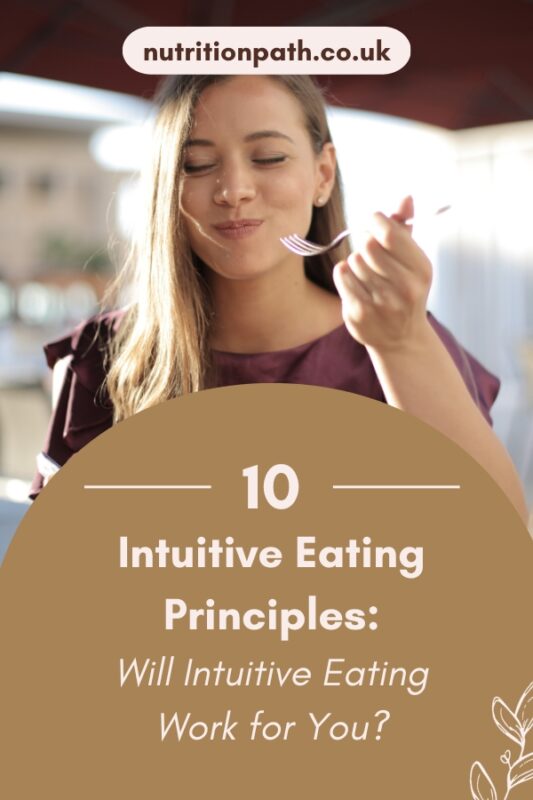
4. Challenge the Food Police
Notice the rigid diet rules you may hold around certain foods, times of eating or yourself, linked to your food habits. These rules may have come from fad diets, social circles or diet books, but learn to recognise them.
Challenge the thoughts that declare you’re ‘good’ for eating minimal calories or ‘bad’ because you ate a piece of cake. This is a form of dieting mentality and will only lead to negative thoughts and feelings of guilt. If you’re listening to the Food Police- you’re listening to external guidance, rather than your own body.
5. Discover the Satisfaction Factor
Eating should be an enjoyable experience even if you are working towards a health goal.
Choose meals that offer both pleasure and nutrition, so you don’t end up feeling deprived, which may lead to overeating and food guilt. Find out what foods truly satisfy your body – it could be anything from grilled salmon to oat cookies!
Prioritize pleasure, satisfaction and taste when eating to ensure maximum satisfaction and nourishment.
6. Feel Your Fullness
It is important to learn how to recognize and respond to physical signs of fullness. The body’s natural fullness signals will tell you when it’s time to stop eating. But they often get ignored as life is just busy!
Learn to identify the subtle signals your body gives you during meals. While it may take some practice, getting the balance between feeling pleasant fullness and being overly stuffed is key.
7. Cope with Your Emotions with Kindness
Unconditionally accept all of your emotions, even those that may be uncomfortable or difficult to deal with. Aim to sit with them and understand them rather than attempting to control them with food.
You may not really be sure of what and when you’re feeling or not even sure where to start. In that case start an emotion and food diary. This can help you identify the emotional patterns without judgment and help you be the observer.
8. Respect Your Body
Treat your body with the respect and kindness it deserves, no matter what size or shape it is in. Find ways to feel good about yourself not just related to body image. Find self-care activities like gentle exercise and movement, relaxation, and hobbies that bring you joy.
When was the last time you felt good in the body without changing its shape and size?
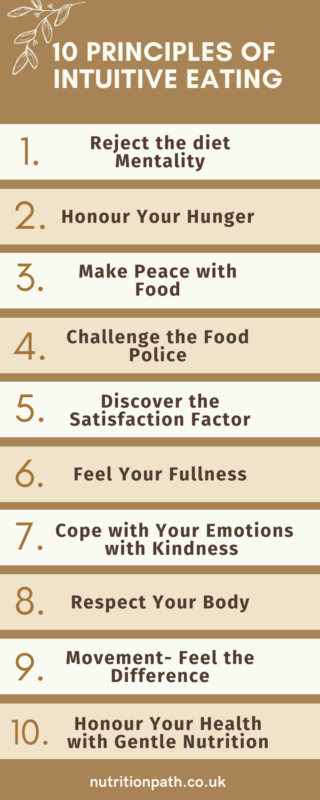
9. Movement- Feel the Difference
Connect to your body and the sensations it sends through physical movement. Think: How would you be exercising if exercise didn’t change your shape and size?
The idea is to be mindful, not about how many calories you are burning. Learn to appreciate the pleasure of feeling your body move. Also, discover what kinds of movement make you feel energized, alive and strong in your body.
10. Honour Your Health with Gentle Nutrition
If nutrition is something that feels particularly tricky for you, remember that food is fuel and nourishment. Honour your health with pleasure in mind, trusting yourself to make choices that are nutritious for you.
When deciding what to eat, consider the physical hunger cues, using the intuitive eating hunger scale. Also, explore if there’s an emotional or environmental reason why you’re craving those specific foods. Observe how different types of foods make you feel and how you prefer to be feeling.
Changing your relationship with food isn’t just about learning the Intuitive Eating Principles. It’s also about putting them into practice, which sometimes can be challenging. Especially if you’ve used dieting food rules, calories and external guidance of what to eat and what not to eat for years or even decades.
That’s exactly why it can be a good idea to consider working with an intuitive eating coach and use helpful resources. The intuitive eating hunger scale is a great one to get started with towards lasting food freedom.
Getting Familiar with the Intuitive Eating Hunger Scale
The intuitive eating hunger scale is a simple, yet powerful tool that helps you understand your body’s cues for hunger and fullness. It’s designed to provide you with more insight into when it’s best to eat or drink something. Also, when it’s time to move away from the table and avoid getting seconds (or thirds).
You can start by rating your hunger level on a scale of 0-10 (0 is very hungry and 10 is overly stuffed). Our body’s like balance so it’s generally a good practice to avoid getting to 1-2 and feeling ‘hangry’ and irritable, as this can lead to overeating and binging.
Additionally, it’s a good idea to avoid routinely getting to 8-10 on the intuitive eating hunger scale. This can lead you to feel overly stuffed, full and uncomfortable. Yet, keep in mind that overeating sometimes is a completely normal practice. Especially, when it’s done consciously and with kindness.
Once you have a better grasp of the intuitive eating hunger scale, it will become easier to respond appropriately to your body’s signals of hunger and fullness.
It may take consistent practice to help your body’s hunger and fullness cues restore after years of dieting and/or binge eating. However, will help you move away from dieting and towards a healthier relationship with food.
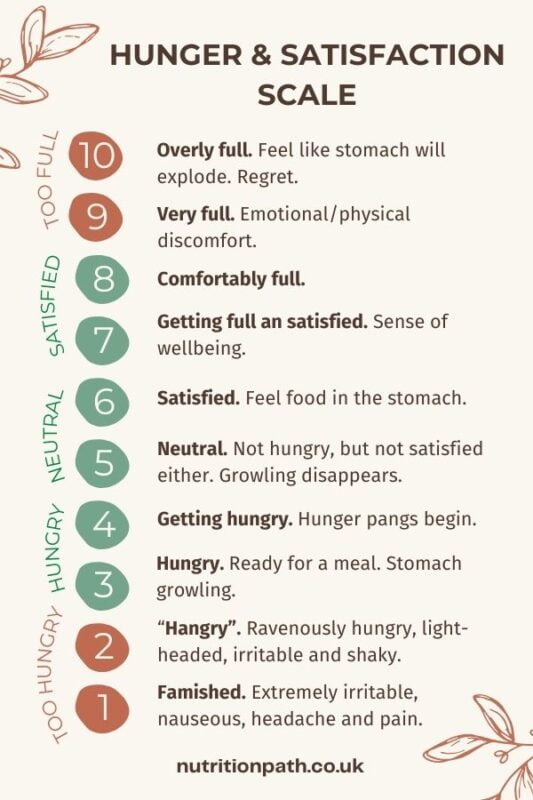
Here’s What You Need to Know if You Tried Intuitive Eating, but it Hasn’t Worked for You
Intuitive eating is a powerful, wonderful tool to use in your journey towards making peace with food for good. Most people have the potential to learn it and make it work. Also, it’s necessary to know a couple of things about why it may not be working for you as expected.
If you have been using restriction as a tool to manage your weight, be it dieting, extreme or frequent cleanses and detoxes or simply skipping meals, chances are your body is out of balance physically. And so the signals that your body sends you may not be accurate.
If you cannot even remember the last time you were eating intuitively, you may not even know HOW to listen to the body in the first place.
How to reconnect with the body again
Perhaps you have been listening to external guidance for a while. This means that you are familiar with the times when restriction backfires and causes you to binge, overeat or gorge on sugar. This, in turn, may cause feelings of guilt and shame afterwards.
Additionally, if your body is missing nutrition, it will create cravings, especially for foods that are quick energy, such as stimulants, simple carbs and sugars. Hence when moving straight from years of dieting and restriction to intuitive eating, you may find yourself eating tons of sugar and not being able to stop.
Yes, you should be able to stop once you have enough and your body is filled with nutritious energy. However, there’s a little issue with this when it comes to sugar because our satiety receptors do not recognise sugar as well. So, you might be eating a big volume of food, yet still feel hungry, be malnourished and be putting on unnecessary pounds.
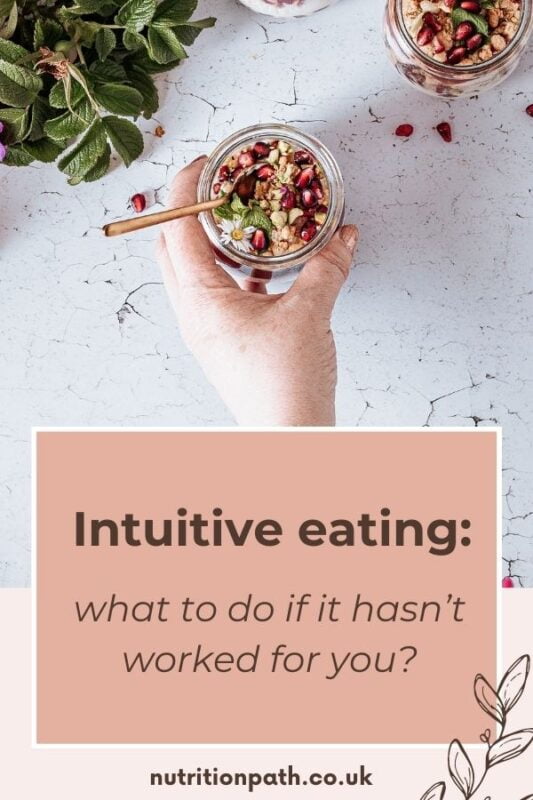
Should You Consider Working with an Intuitive Eating Coach?
I get it, applying Intuitive Eating Principles and changing your food habits and the way you think about food can be completely daunting. Several of my past clients have tried to apply Intuitive Eating by themselves and got even more confused with food. So if you are serious about reaching food freedom and you know you need help, try working with an Intuitive Eating Coach to help you progress.
What is an Intuitive Eating Coach?
An Intuitive Eating Coach often is a skilled professional, often with a nutritional background, such as a registered dietician, nutritional therapist (or certified nutrition specialist) or nutritionist, however, it could also be a counsellor, psychotherapist or life coach.
Intuitive Eating Coaches are typically highly skilled at helping clients gain clarity in their relationship with food. They can guide well on topics such as mindful eating and nourishing yourself well. Also, helping to get a grasp of the 10 Intuitive Eating Principles and be able to apply them to their lives effectively.
Moreover, if you have a history of eating disorders, trauma or body image issues, working closely with an intuitive eating coach may be beneficial for your mental and physical well-being. Intuitive eating coaches generally work in a one-on-one setting to help clients make a smooth transition away from dieting culture towards food freedom.
However, if you currently experience diagnosed eating disorders, it’s a good idea to consider working with a professional, who has additional qualifications and specialises in eating disorder recovery.
Intuitive eating principles: The Bottom Line
Intuitive Eating Journey is one of reconnecting to your natural hunger and fullness cues. All while finding nourishment for both your mind and body and cultivating a healthy relationship with food.
By understanding the 10 Intuitive Eating Principles, you can learn to better listen to your body’s needs and develop an overall healthier relationship with food, even if it sounds scary and very alien right now.
It takes time to stop seeing food as the enemy, but rather as a necessary part of life that can be enjoyed without guilt or shame. With some patience and practice, you’ll soon be able to trust your body’s hunger and fullness cues and develop beneficial eating habits to last a lifetime.
Take the first step today and take back your relationship with food by exploring intuitive eating principles! With patience, understanding and self-compassion, you too can break free from dieting and learn to trust your body again.
Happy Eating! 🍴
FAQ about the Intuitive Eating Principles
- What is Intuitive Eating? How does it actually work?
Intuitive eating is based on 10 principles that help improve the relationship to food and the connection to the body. Based on listening to hunger and fullness cues and honouring the body. It’s also about being conscious about your habits and thoughts around food. - How can I stop the dieting mentality and practice Intuitive Eating?
Start by noticing where dieting mindset still has a hold on you. Reject food rules, punishing your body and aim to start listening to your hunger and satiety cues. You can also work with a qualified Intuitive Eating coach if you are getting lost and need support. - What are the core principles of Intuitive Eating? The principles are: reject the diet mentality, honour your hunger, make peace with food, challenge the food police, discover satisfaction, cope with emotions without food, respect your body, and engage in gentle nutrition.
- Can Intuitive Eating help me lose weight?
The main goal of Intuitive Eating is not centred around weight loss. But it’s not uncommon for people to lose weight (if they carry excess) once they create a more peaceful relationship with food and better habits. - How can I know if it’s real hunger or emotional cravings when practicing Intuitive Eating?
Real hunger usually takes time to increase and is satisfied by a nutritious meal. While emotional cravings come on suddenly and are for specific foods, like chocolate or chips.
Disclaimer: Intuitive Eating is not meant to replace professional medical advice or treatment for diagnosed mental health disorders. If you are struggling with an eating disorder, please seek help from a qualified healthcare professional.
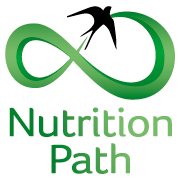



One thought on “10 Intuitive Eating Principles: Will Intuitive Eating Work for You?”